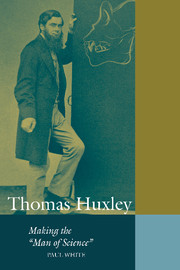Book contents
- Frontmatter
- Contents
- Illustrations
- Acknowledgments
- Introduction
- 1 Science at Home
- 2 Gentlemen of Science? Debates over Manners and Institutions
- 3 Science as Culture
- 4 The Worship of Science
- 5 “Darkest England”: Science and Labor in the 1880s and 1890s
- Conclusion: The End of the “Man of Science”
- Bibliography
- Index
- Frontmatter
- Contents
- Illustrations
- Acknowledgments
- Introduction
- 1 Science at Home
- 2 Gentlemen of Science? Debates over Manners and Institutions
- 3 Science as Culture
- 4 The Worship of Science
- 5 “Darkest England”: Science and Labor in the 1880s and 1890s
- Conclusion: The End of the “Man of Science”
- Bibliography
- Index
Summary
A tendency to excessive reverence for men of science … often subdues me, and, when I find myself unsustained in my inmost convictions, depresses and afflicts me.
– James Martineau, 1868If Huxley's scientific identity was derived in part from the identities of the artist and man of letters, how then was the man of science defined in relation to the clergyman, the figure who in many respects appears his most obvious counterpart or rival? Until the early Victorian period, scientific practitioners had often been clergymen by vocation. Leading naturalists such as William Buckland, Adam Sedgwick, and John Henslow not only combined their respective geological and botanical pursuits with clerical office but actively incorporated their science within the Anglican tradition. Natural theology continued to provide a unifying structure for English science well into the nineteenth century. Even practitioners like Darwin, who chose not to pursue a Church living, and whose work was viewed by some as undermining the principle of design in nature, still occupied traditional positions in society that rested partly on religious foundations and exercised a quasi-religious authority in their local communities. The appearance of Darwin's Origin of Species and other works, however, has long been associated with the decline of religious authority over the mind, and as evidence of the gradual secularization of knowledge and the corresponding replacement of religious leadership in a variety of quarters by new professions.
- Type
- Chapter
- Information
- Thomas HuxleyMaking the 'Man of Science', pp. 100 - 134Publisher: Cambridge University PressPrint publication year: 2002



